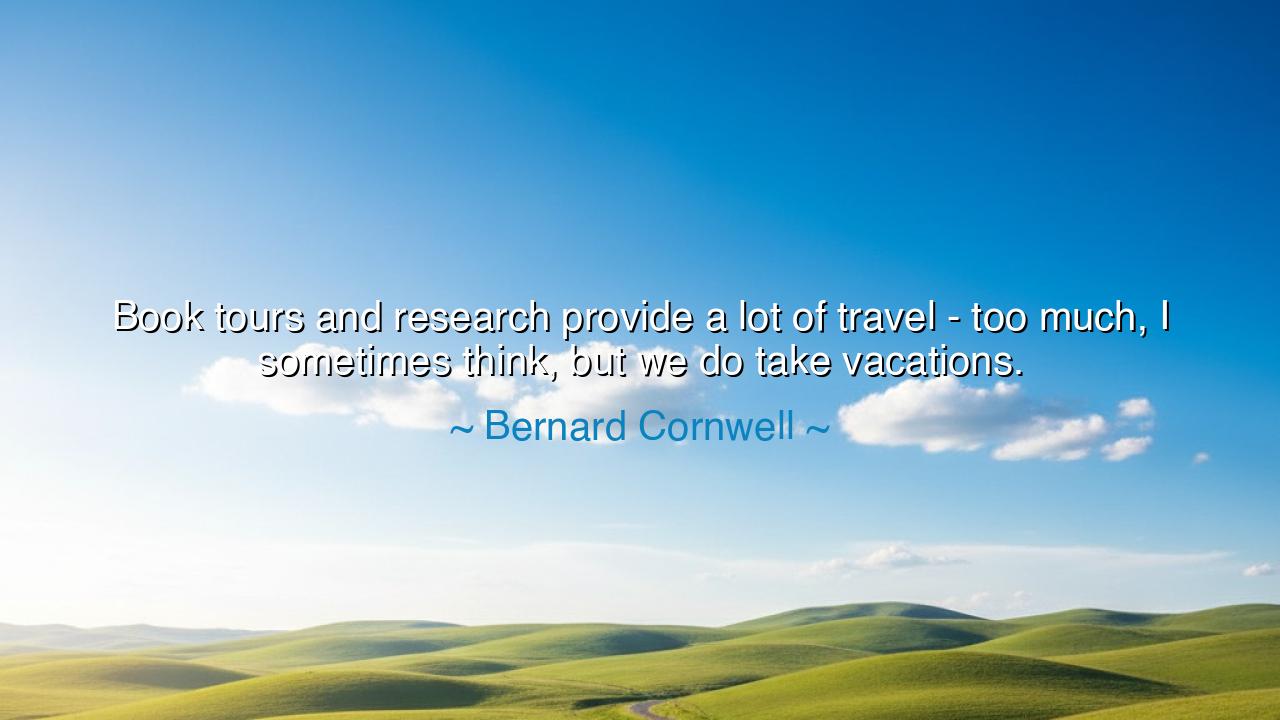
Book tours and research provide a lot of travel - too much, I
Book tours and research provide a lot of travel - too much, I sometimes think, but we do take vacations.






Bernard Cornwell, teller of epics and chronicler of forgotten battles, once confessed with honesty: “Book tours and research provide a lot of travel – too much, I sometimes think, but we do take vacations.” These words, though plain, reveal a paradox as old as the human heart: that even noble labor, even the work one loves, can become a burden if it consumes without rest. Cornwell, who travels to breathe life into the past, reminds us that creation itself carries a cost. The road, though filled with discovery, can grow weary to the traveler, and even the most passionate work must be balanced by moments of leisure and renewal.
The ancients themselves knew this law. The philosopher Aristotle taught of the “golden mean,” the balance between extremes, where virtue is found. To labor without pause is to tilt into exhaustion; to rest without purpose is to fall into sloth. Cornwell’s words are the echo of this wisdom: research and tours demand much, and though they bring riches of knowledge and connection, there must also be space for the soul to breathe in the quiet joy of vacation.
There is in his words a recognition of too much. This is a phrase of humility. For ambition often blinds us to excess. The general longs for one more campaign, the scholar for one more text, the artist for one more brushstroke. Yet Cornwell admits that even noble travel can grow heavy, and that one must sometimes step back. This is not failure, but wisdom—the wisdom of knowing that endless forward motion does not always lead to greatness, and that sometimes to pause is to preserve the flame that otherwise would burn out.
History teaches us this truth with clarity. Consider the life of Hadrian, emperor of Rome, who traveled ceaselessly across the empire to strengthen its borders and unify its people. His journeys were monumental, his vision vast, but even he knew the need for retreat. In the villa he built at Tivoli, he sought refuge from the endless demands of empire, walking among gardens and reflecting in stillness. Without such pauses, even the greatest of rulers would have crumbled beneath the weight of constant journey. Cornwell’s words resonate with this same balance between duty and rest.
The lesson for us is radiant: labor must be balanced with leisure. Work, however noble, cannot be the whole of life. To neglect rest is to rob the soul of its strength. The poet must put down the pen, the craftsman his tools, the laborer his plow, if only for a while, to return renewed. The pause is not weakness—it is part of the rhythm of greatness, the silent half of the song without which no melody endures.
Practically, this means embracing cycles of effort and renewal in our own lives. If you are consumed by your work, dare to rest. If you travel constantly for duty, make time for travel of joy. Vacations are not indulgence but medicine for the spirit, preparing the heart and mind to face labor anew. As Cornwell wisely reveals, even the most rewarding journeys require balance with those chosen simply for peace and delight.
Thus, Bernard Cornwell’s words shine as a teaching for the ages: all roads, even the roads of purpose, must be tempered with roads of rest. To travel endlessly for duty is to wear the soul thin. To pause, to take vacation, to breathe in stillness—this is what preserves the traveler for the next journey, and what makes labor not a burden, but a joy renewed.






AAdministratorAdministrator
Welcome, honored guests. Please leave a comment, we will respond soon